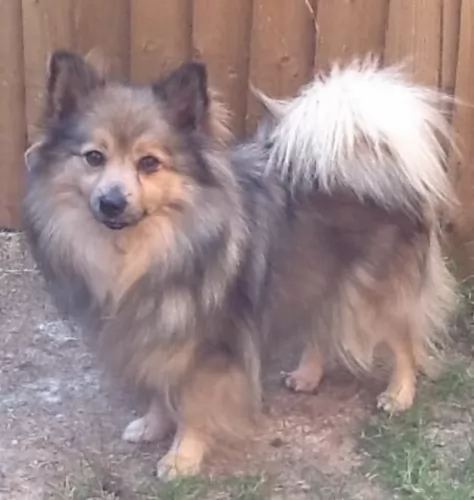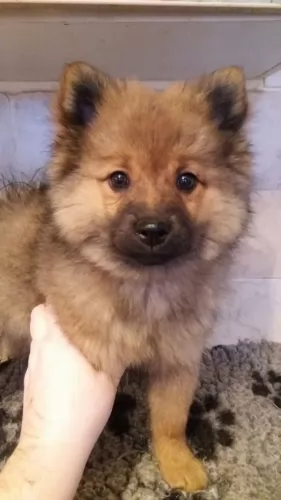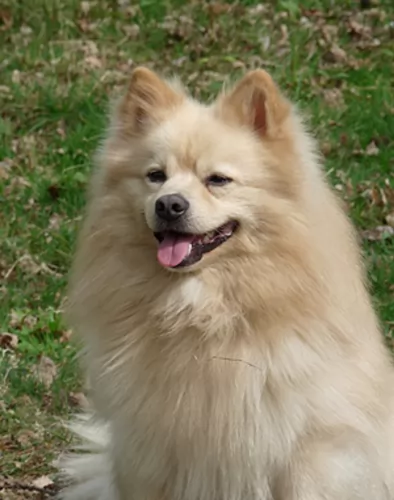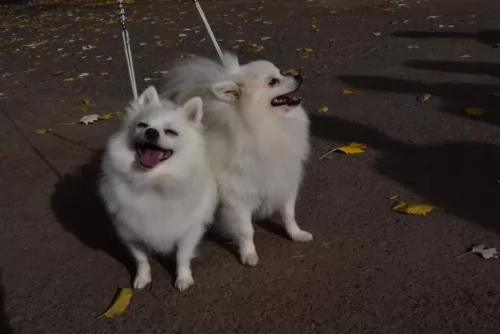 Petzlover
PetzloverGerman Spitz (Mittel) is originated from Germany but North Country Beagle is originated from United Kingdom. German Spitz (Mittel) may grow 7 cm / 2 inches shorter than North Country Beagle. Both German Spitz (Mittel) and North Country Beagle are of same weight. Both German Spitz (Mittel) and North Country Beagle has almost same life span. Both German Spitz (Mittel) and North Country Beagle has almost same litter size. German Spitz (Mittel) requires Moderate Maintenance. But North Country Beagle requires Low Maintenance
 Originating in Germany, the German Spitz Mittel is an alert, vigilant dog and it is these qualities that made him sought after for working on farms.
Originating in Germany, the German Spitz Mittel is an alert, vigilant dog and it is these qualities that made him sought after for working on farms.
He is no new breed and is the 3rd largest of the five German Spitz varieties. It is believed that the German Spitz descended from the Northern sled and herding dogs which arrived with the Vikings into Europe. When you do research you see that the dogs are mentioned in German literature which dates way back to to 1450 already.
Known also as the Northern Hound or the Northern Beagle, the North Country Beagle hailed from Britain and is extinct.
It hailed more specifically from- and was native to the Yorkshire and Northumberland regions of England. As a scenthound it was known for its hunting skills.
There isn’t much known about the dog but it is one of England’s oldest hound breeds, with much of its ancestry been lost. There are many theories surrounding the origins of this dog. Also, the date at which the North Country Beagle was developed is also debatable but it has always been a good hunter.
 The German Spitz Mittel is similar in looks to the other sizes of German Spitz. The Mittel is a medium sized dog and stands between 30 and 38cm in height and weighs between 7 and 11kg. You’ll find him in solid colors such as tan, liver, white, fawn, black or a mix of these colors.
The German Spitz Mittel is similar in looks to the other sizes of German Spitz. The Mittel is a medium sized dog and stands between 30 and 38cm in height and weighs between 7 and 11kg. You’ll find him in solid colors such as tan, liver, white, fawn, black or a mix of these colors.
He has a soft woolly undercoat and a long outercoat with a mane-like ruff at the neck. He has a fairly long muzzle, dark eyes, sharp erect ears and a bushy tail which curls over his back.
Affectionate, faithful, and always happy by nature, the German Spitz Mittel is a family companion that wants to be part of everything his human family is up to. He makes a good watchdog. He is alert and has a distrust of strangers.
He gets on well with children in the home and he can also live in peace with other dogs. Because he is an intelligent dog, you won’t have much trouble with training- and socializing him, although he will require a firm, consistent owner and trainer.
Training and socialization are important as there are always some important commands such as sit, stay, come and lie down that you will want him to respond to immediately.
The North Country Beagle seemed to vary quite a bit in size and because there isn’t much information on this extinct dog, we can assume he was much the same size of the Beagle we know today which is roughly 33 – 45cm in height and weighing between 9 and 11kg.
Not much is known about the dog’s appearance but it is believed that it looked much like the Southern Hound and English Foxhound. It was likely a medium sized dog with longish ears, thick bones but always agile and athletic.
There is very little known on what this dog’s temperament was like. He was strong willed and if you owned such a dog you would have had to have him trained and socialized. It was a dog that showed very little signs of aggression. It seemed the dog was friendly, social and loving to his human family.
 People who have owned a German Spitz Mittel are delighted with him, saying that he is such an easy-going, happy dog. He is social and thrives on the interaction he has with his human family.
People who have owned a German Spitz Mittel are delighted with him, saying that he is such an easy-going, happy dog. He is social and thrives on the interaction he has with his human family.
He won’t do well if you simply put him in your backyard and forget about him, using him merely as a watchdog.
The German Spitz Mittel dog is one dog that definitely lives up to the title of man’s best friend. He is social, happy, loving, loyal, playful, entertaining and smart too, and when you treat him the way he deserves, you’ve got the most awesome friend.
The North Country Beagle was a social, energetic dog who loved spending time with his human family. They were intelligent too, so training and socialization were possibly easy for him.
They weren't regarded as raucous kind of dogs and were fairly quiet. They were quite social and didn't like being left alone for too long. They were adaptable too, slotting quite easily into country- or city life.
Coolish with strangers, the North Country Beagle made a good pet and companion with a generally happy, contented disposition.
 German Spitz dogs are healthy, and when you shower him with love and attention and good food, you can expect to have him around for up to 15 years of age.
German Spitz dogs are healthy, and when you shower him with love and attention and good food, you can expect to have him around for up to 15 years of age.
Of course, as with any other healthy dog breeds, there are always one or two common dog illnesses that your dog may get. These include hip dysplasia and eye diseases. If you notice symptoms that indicate possible joint issues with your pet, get him to the vet immediately.
Patellar Luxation for instance occurs when your dog’s kneecap is dislocated. It is more common in toy breeds like the German Spitz. It can be painful for your pet and lead to lameness. If your dog has problems with his hip, it can actually force the patella out of its groove, which is a secondary condition.
The North Country Beagle had a lifespan of 12 to 15 years, and while he was a fairly healthy dog breed, there were some common health issues to look out for. Some of these were patellar luxation, epilepsy and glaucoma.
This is a condition where there is pressure in the eye and where there is inadequate fluid drainage as well. Left untreated, it can lead to permanent damage to the optic nerve which can lead to blindness.
It is fairly common in certain breeds. There is primary and secondary glaucoma and symptoms for instance with primary glaucoma can be this high pressure within the eye and also a cloudy appearance in front of the eye along with redness of the blood vessels and dilated pupils. There can also be headaches and loss of appetite.
 You can help reduce loose hairs with your German Spitz by brushing his thick coat twice a week. It’s a good time to also inspect your dog for ticks and fleas.
You can help reduce loose hairs with your German Spitz by brushing his thick coat twice a week. It’s a good time to also inspect your dog for ticks and fleas.
Your German Spitz Mittel isn’t the most active dog, but he will still need regular exercise. Going on a walk is good for both you and him. He is a mentally sharp dog too and these walks keep him both physically- and mentally fit. He also loves ball games.
Every dog deserves the best food, and if you feed your German Spitz Mittel with a commercially manufactured dog food, make sure its one of the top quality ones. You want to avoid foods packed with preservatives, colorants and fillers. You want dog foods with minerals and vitamins with high protein and ingredients such as Omega 3 and 6 to promote health skin.
There are also some dog foods which have ingredients in them such as polyphosphates. Ingredients like this keep your dog’s teeth clean.
Try and also give him some cooked rice, vegetables and chicken mixed into his kibble from time to time as well as raw meat. He should never be without fresh, cool water.
Your North Country Beagle was a social animal and he always had a whole lot of love and friendship to offer his human family.
Today, if you bring such a dog into your home, its your responsibility to care for him and provide him with love.
A puppy such as this would have been fed 4 times a day. As he got older he would have had his meals cut down to one or two a day. His owners would have chosen a dog food according to age and activity levels, but always made sure that the food was rich in vitamins and minerals.
Dry kibble has the advantage of keeping your dogs teeth clean. Home-made food was and is always a welcome treat and can occasionally be added to the dry kibble. Keep the food consistent and simple to avoid stomach upsets.
Boiled chicken, brown rice or pasta and some cooked vegetables such as carrots, sweet potato and spinach would have kept the Beagle happy and healthy and is an excellent diet today for modern dogs. Sometimes you can also give a little bit of raw meat. Never leave any dog without a constant supply of fresh, cool water.
Your North Country Beagle would have required lots of energy and will have required being exercised. His owners may have taken him for walks every day, and modern Beagles today would require ball games and games that also provide him with the chance to think and work things out.
If you bring a pet home such as what the North Country Beagle was like, as a puppy, you would have had to make a vet appointment to ensure he had his vaccinations to protect him from deadly diseases.
General grooming of your North Country Beagle would have required you brushing him twice a week, checking inside and outside his ears for infection. This is particularly of importance with floppy eared dogs like this. Check his eyes and teeth too. His nails couldn't be neglected either, as left long, they could have hooked onto objects, tearing and causing pain and bleeding.